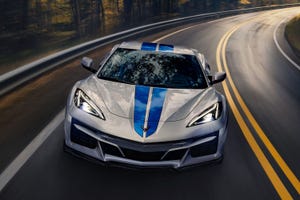
2024 Chevrolet Corvette E-Ray Is an All-Season Performance Hybrid - CNET
For the Corvette’s 70th birthday, Chevrolet’s engineers have given it the gift of electrified power, debuting the new 2024 Chevy Corvette E-Ray. The E-Ray is both the first hybrid and the first all-wheel-drive model in the nameplate’s history. Boasting 655 horsepower and a 2.5-second 0-60 sprint, it’s also the quickest production ‘Vette ever.
The E-Ray starts with the same 6.2-liter LT2 V8 as the standard Corvette Stingray. From its perch amidships, it sends 495 horsepower and 470 pound-feet of torque to the rear wheels via an eight-speed, dual-clutch transaxle. Chevy’s engineers then add a 160-horsepower electric motor to the front axle, bringing with it an additional 125 pound-feet of torque. The motor draws current from a high-voltage lithium-ion battery pack tucked into the transmission tunnel between the seats — where the propshaft would have been before the ‘Vette went mid-engined for this generation.
With just 1.9-kilowatt-hours of capacity (slightly more than a Prius’ 1.2-kWh pack) there’s no need for a plug; the E-Ray’s self-contained hybrid system is able to charge solely via regenerative braking during deceleration or coasting. The E-Ray’s 12-volt battery — which supports the V8, start-stop and accessory power systems — has also been upgraded to a lightweight lithium-ion unit.

According to Chevy, the electric motor “works in harmony with the LT2 engine to create an invigorating sound.”
Chevrolet
Working in concert, the E-Ray’s electric all-wheel drive, or eAWD, system outputs a combined 655 horsepower and runs the quarter-mile in just 10.5 seconds. More impressive is its 0-60 mph sprint in just 2.5 seconds. That’s 0.4 second faster than the standard Stingray and 0.1 second quicker than the race-bred Z06, making this the quickest production Corvette yet. The lighter Z06 is probably still the most finely honed tool for track use, but the E-Ray boasts a number of other advantages on the road.
For starters, the eAWD system promises improvements to traction and stability in low-grip situations, potentially making this an all-season sports car that’s better equipped to tackle rain, snow or ice than its rear-driven predecessors. eAWD should also enable the Corvette’s Active Fuel Management cylinder-deactivation tech to more liberally take advantage of the V8’s four-cylinder mode during coasting and cruising for improved fuel economy.
The E-Ray also introduces new Stealth and Charge Plus Modes. When selected before start-up, Stealth Mode uses only the front electric motor for near-silent operation up to 45 mph. When it hits that speed, or the battery pack’s limited range is exceeded, the V8 automatically kicks over. Charge Plus, on the other hand, maximizes the battery’s state of charge — presumably via more aggressive regeneration — for more consistent electric assist and performance during extended track sessions.
The E-Ray will be available with carbon-fiber aerodynamic bits and carbon-fiber wheels similar to those available on the Z06.
Chevrolet
Externally, the E-Ray is 3.6 inches wider than Stingray, sharing its wide-body proportions and body panels with the Z06. Tucked into its flared arches are staggered 20-inch front and 21-inch rear wheels with a unique E-Ray five-spoke design. Michelin Pilot Sport all-season tires are standard. Upgraded Pilot Sport 4S summer tires are available as part of a ZER Performance Package, boosting the E-Ray’s lateral grip to around 1.1 G’s. Brembo carbon ceramic brakes and Chevrolet’s Magnetic Ride Control 4.0 system are also standard equipment for the performance hybrid.
Inside, the ‘Vette’s infotainment and digital instrument cluster screens feature new layouts that display and monitor the power and efficiency of the electric motor and V8. The E-Ray will also be offered with the full roster of 2024 Corvette driver-assistance tech, including lane keep assist, forward collision alert and automatic emergency braking. The E-Ray’s cargo volume of 12.5 cubic feet is virtually unchanged from the Stingray (12.6 cubes), so it looks like adding an electric motor to the front doesn’t significantly compromise the under-hood frunk.
The 2024 Chevrolet Corvette E-Ray arrives later this year, starting at $104,295 for the 1LZ coupe or $111,295 for the 1LZ convertible, before destination charges that currently sit at $1,395.



